Join May 14 at 11:00 am for the virtual AccelHERator seminar. Please register to receive webinar access
You are invited to learn how academic investigators can position their science to compel industry stakeholders and develop the relationships with corporate and investor partners that will help bring their discoveries to market.
This session includes a 30-minute “Pitching best practices” seminar and a conversation led by Christy Wyskiel, Executive Director of Johns Hopkins Technology Ventures, with Jill Carroll(JHSOM ’99), Principal at S.R.One, a global biotech venture capital firm founded in 1985 by GlaxoSmithKline (GSK).
About the AccelHERator: A new year-long pilot program to nurture female inventors and applied research, the AccelHERator celebrates the community of Johns Hopkins women whose academic ingenuity will change the world.
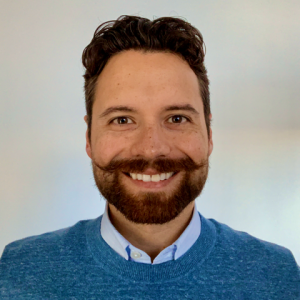
Please join us for a seminar with Netz Arroyo, INBT associate faculty member. Join us using the Zoom information below.
https://wse.zoom.us/j/93459776858?pwd=S01FNDRGS0tTVHc4enBoYi9XbmpuQT09
Meeting ID: 934 5977 6858
Password: 114461
“Continuous, Real-Time monitoring of Small-Molecule Therapeutics in the Body”
Abstract: Personalized drug therapy seeks to tailor treatment to the individual, taking into consideration each person’s unique genotype and metabolism to determine a dose that maximizes drug efficacy and avoids toxicity. Realizing this goal has been extremely challenging, however, for two main reasons. First, it is difficult to determine the optimal drug dose for each patient due to our limited understanding of pharmacogenetics and physiology. Second, even the most sophisticated drug delivery approaches fail to account for hour-to-hour fluctuations in an individual’s metabolism driven by changes in health status, diet or drug interactions. Thus, there remains a pressing need for technologies supporting the real-time, in-vivo monitoring of drugs that would enable patient-specific, metabolism-responsive dosing. In response to this need, our laboratory pursues the development of reagentless sensing approaches that support continuous molecular measurements in the body. During this talk, I will describe an electrochemical approach that relies on DNA aptamers to perform real-time monitoring of small molecule targets, and the use of this approach to study pharmacokinetic changes in rats that originate from biological and metabolic variability.
Biography: Netz Arroyo is an Assistant Professor in the Department of Pharmacology and Molecular Sciences at the Johns Hopkins University School of Medicine. He has secondary appointments with Chemical and Biomolecular Engineering, Biochemistry, Cellular and Molecular Biology, and the Chemistry-Biology Interface programs. He received his B.S. in Chemical Sciences from Tec de Monterrey (Mexico), his Ph.D. degree in Analytical Chemistry from the University of Texas at Austin, and his postdoctoral training in Bioengineering from the University of California Santa Barbara. Dr. Arroyo’s research focuses on the development of electrochemical biosensing platforms that enable continuous, real-time measurements of specific molecules in the body. His lab employs such sensors to study molecular transport of therapeutics across biological barriers in vivo, and to develop decentralized, high-precision diagnostics for health care monitoring.
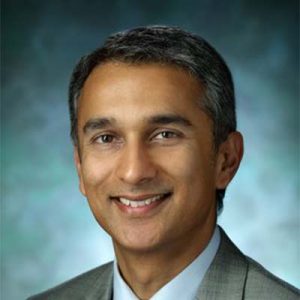
“Image-based” Vascular Phenotyping In Cancer, Tissue Engineering And Neuroscience”
Please join us for a seminar with associate faculty member Arvind Pathak.
Zoom link: https://wse.zoom.us/s/97783644656
Webinar ID: 977 8364 4656
Password: 501459
Abstract
This lecture will highlight the development of multiscale and multimodality imaging approaches in conjunction with novel computational and visualization tools to revolutionize our understanding of the role of blood vessels in cancer, tissue engineering and neuroscience applications. This lecture will showcase new functional imaging methods; image-based systems biology approaches; and the design of new imaging systems and software tools for characterizing the vascular microenvironment. Collectively, these innovations herald a new era in “image-based” phenotyping in preclinical models.
Biography
Dr. Arvind P. Pathak is Associate Professor of Radiology and Oncology at the Johns Hopkins University School of Medicine and a member of the Johns Hopkins Kimmel Cancer Center. His work focuses on developing new imaging methods, computational models and visualization tools to ‘make visible’ critical aspects of cancer, neurobiology and tissue engineering.
Dr. Pathak received his BS in electronics engineering from the University of Poona, India, in 1993, and in 2001 completed his PhD in Functional Imaging from the joint graduate program between the Biophysics Department at the Medical College of Wisconsin and the Biomedical Engineering Dept at Marquette University. During his PhD he was the recipient of a Whitaker Fellowship. After a postdoctoral fellowship in the Molecular Imaging Program at Johns Hopkins University, he joined the Johns Hopkins faculty in 2003.
Dr. Pathak’s research has been recognized by several awards and journal covers. These include the Bill Negendank Young Investigator Award from the International Society for Magnetic Resonance in Medicine (ISMRM) given to “outstanding young investigators in the field of cancer MR” and the ISMRM’s Outstanding Teacher Award for 2014. He has advised over sixty students and is a much sought after mentor.
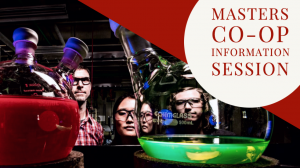
Please join us for a virtual information session to learn about the INBT’s Masters Industry Co-Op Program.
To broaden the practical training for Master of Science in Engineering (MSE) students in the Whiting School of Engineering, INBT collaborates with major industry partners to offer these students a six-month Co-Op opportunity that provides industry experience, a salary, and college credit. This program is currently only available to students in the Departments of Materials Science and Engineering, Mechanical Engineering, and Chemical and Biomolecular Engineering.
Go to the Masters Co-Op website to learn more about the program.
*The Co-Op program is still active during the COVID-19 pandemic.
Zoom information
Link: https://wse.zoom.us/j/92452322817
Webinar ID: 924 5232 2817
Telephone: Dial (for higher quality, dial a number based on your current location): US: 1-301-715-8592 or 1-646-558-8656 or 1-312-626-6799 or 1-253-215-8782 or 1-346-248-7799 or 1-669-900-6833
BME Presents: Ngan Huang, PhD
Assistant Professor of Cardioghoracic Surgery Research
Stanford University
Host: Warren Grayson & Sharon Gerecht

Engineering the Microsvasculature of Regenerative Medicine
Bio: Ngan F. Huang is an Assistant Professor in the Department of Cardiothoracic Surgery at Stanford University and Principal Investigator at the Veterans Affairs Palo Alto Health Care System. Dr. Huang completed her BS in Chemical Engineering from the Massachusetts Institute of Technology, followed by a PhD in bioengineering from the University of California Berkeley & University of California San Francisco Joint Program in Bioengineering. Prior to joining the faculty, she was a postdoctoral scholar in the Division of Cardiovascular Medicine at Stanford University. Her laboratory investigates the interactions between stem cells and extracellular matrix microenvironment for engineering cardiovascular tissues to treat cardiovascular and musculoskeletal diseases. Dr. Huang has authored over 70 publications and patents, including reports in Nat Med, PNAS, and Nano Lett. She has received numerous honors, including a NIH K99/R00 Career Development Award, Fellow of the American Heart Association, a Young Investigator award from the Society for Vascular Medicine, a Young Investigator Award from the Tissue Engineering and Regenerative Medicine International Society-Americas, and a Rising Star award at the Cell & Molecular Bioengineering conference. Her research is funded by the NIH, Department of Defense, California Institute of Regenerative Medicine, and Department of Veteran Affairs.
Event Link: https://www.bme.jhu.edu/news-events/bme-events/
For the third year, the INBT community is participating as a team in the Adopt-a-Family and Adopt-a-Senior program sponsored by the Johns Hopkins Benefits Office. Johns Hopkins partners with local nonprofit and service agencies to connect employees with families and senior citizens in need during the holiday season.
Due to the COVID-19 pandemic the program is only accepting gift cards. You can purchase a gift card for a senior citizen, family member, or both!
You can register here.
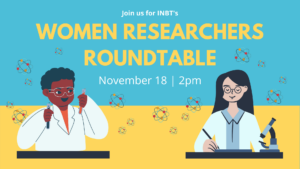
Join other women researchers for a discussion on the challenges women in STEM experience, and how to overcome them. Share your experiences, network, and learn from one another.
This is your chance to asked established women researchers questions you always wanted to ask in a safe and non-judgemental atmosphere. Claire Hur, Daniele Gilkes, and Karen Eisinger will share their experiences, advice, and challenges facing women in STEM. Come with question or listen to the discussion.
About the speakers
- Soojung Claire Hur is the Clare Boothe Luce Assistant Professor of Mechanical Engineering and associate faculty member at the INBT.
- Daniele Gilkes is an assistant professor in the Oncology Department, under the Breast and Ovarian Cancer Program, at Johns Hopkins. She is also an associate faculty member at the INBT and a researcher at the Johns Hopkins Physical Sciences-Oncology Center.
- Tzipora Sarah Karin Eisinger is the Ann B. Young Assistant Professor in Cancer Research University of Pennsylvania Perelman School of Medicine. She is also a researcher in the Johns Hopkins Physical Sciences-Oncology Center.
Registration
Register for the event on Eventbrite. Registration closes 11/17/2020 at 4:30 pm. A Zoom link and passcode will be emailed to registrants the day before the event. Anonymous questions, comments, and experiences can be submitted prior to the event.
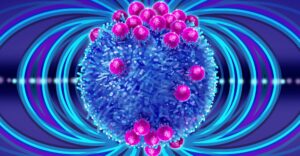
The Johns Hopkins Translational Immunoengineering is hosting a workshop series in January.
The field of immunoengineering combines the diverse and complex fields of engineering and immunology and is transforming patient treatment in cancer, autoimmunity, regeneration, and transplantation. There is a significant need for training of engineers in immunology and for training immunologists in quantitative engineering techniques. Moreover, there is need to bridge basic immunological discoveries with advances in clinical application. This course will review the fundamentals of the immune system and its components, engineering strategies to modulate the immune system, and clinical applications. This workshop series is also being offered for CME credit and as a two-credit course for Hopkins students.
Go to their website to see schedule, speakers, topics, and registration information.
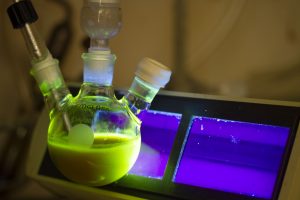
Join people at the Whiting School of Engineering during the week of February 21 through 27 for their annual celebration of engineering and the difference it makes in our world! Scheduled events are subject to change. All events are being held virtually. Register for events on the WSE website.
Aerospace Exploration – Monday, February 22
Tower of Power – Tuesday, February 23
Virtual Symposium on Human Spaceflight – Wednesday, February 24
Oil & Energy Panel – Wednesday, February 24
Speed Networking Night – Thursday, February 25
We welcome students to join the spring information session about our Masters Industry Co-Op program.
The information session will explain how the program provides students with career training while employed with an industry partner. Students gain work experience, network, and build technical skills that prepares them for a competitive job market. Plus, students earn a salary and receive college credit during employment. This program is open to engineering students in chemical and biomolecular engineering, materials science and engineering, and mechanical engineering. Go our Masters Co-Op webpage to learn more and then come with questions to session.
*The Co-Op program is still active during the COVID-19 pandemic offering both in-person and virtual experiences.*
Register for this event on Eventbrite. A Zoom link will be emailed the morning of the event. The event will be held in Eastern Standard Time.


